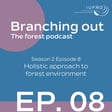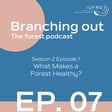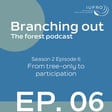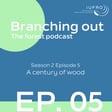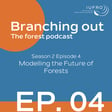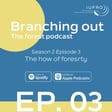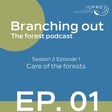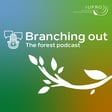Genetic Variation in Plant Survival
00:00:01
Speaker
Unificiology to understand why the plant is dying and you need genetics to identify the plants with the adequate genetic variation to survive.
Introduction to 'Branching Out' Podcast
00:00:18
Speaker
Hello everyone, this is Jose Olanos from the International Union of Forest Research Organizations, IUFU, the global network for forest science cooperation, and you're listening to season 2 of Runching Out, the forest podcast.
Focus on Physiology and Genetics in IUFRO
00:00:31
Speaker
It's great to have you with us as we explore more forest science. Last time, we talked about IUFU's division 1, silviculture.
00:00:39
Speaker
with its two co-coordinators. Today is the turn of division two, physiology and genetics. So secure your gimbal, this is going to be quite the ride. And here with me is my co-host, Nilo. I hope I pronounced this right. We Yaya from the International Forestry Steering Association. If so, please Nilo, the forest floor is yours.
00:01:03
Speaker
Hello everyone, my name is Nizin Puyu, VJF. I'm a member of the International Press Student Association, and I'm the capital point of the Southport Support Council. I am currently a student at the University of South Korea, in Indonesia, where I serve as the president of the ISSA Local Balmiki.
Experts in Tree Genetics: Amanda & Santiago
00:01:20
Speaker
And as for as a student specializing in press policy, I am particularly excited to engage with IFR-D person too, which is not very much of what I'm doing daily. Thank you Aifu for this initiative opportunity.
00:01:33
Speaker
Welcome to Branching Out and we have today the two co-coordinators of Division 2 here to answer some questions, you know, a little bit about their stories and provide their expertise.
Fascination with Conifer Genetics and Genomics
00:01:44
Speaker
And so if I may ask you to briefly introduce yourself.
00:01:48
Speaker
Hi, everyone. My name is Amanda de la Torre. I am an associate professor of forest genetics. I live in Arizona in a city called Flagstaff that's in the mountains of Arizona in the United States. And I have been here for the last six years. I joined Ayufro as division two coordinator this summer.
00:02:13
Speaker
um very new, but I have been working for IU for several years as a task force coordinator before. So welcome Amanda, now it's Santiago. Hello everybody, I'm Santiago, Gonzales Martinet, but everybody calls me Santi, and I'm the director at UI in France, and I'm based in Bordeaux, in Southwestern France.
00:02:38
Speaker
I have developed my career working with population genetics, mostly in trees of course, and what is population genetics is basically looking how genetic diversity is distributed among or within populations and what is the processes and factors that will increase the diversity or reduce diversity.
Adaptations of Conifers to Diverse Environments
00:03:02
Speaker
To help us to get to know you better, is there a specific tree, species or ecosystem that you find it especially fascinating and what drops you to it? I'm fascinated by conifers because they are species that are having the very great diversity of environments and we can find conifers in the southern hemisphere, in semi-tropical photos. You can have them in the northern hemisphere, in these very large photos, in then northern Jude, open Asia, in the tundra. And what they make them particularly interesting for for me is the incredible
00:03:37
Speaker
Adaptation, the heart to the environments, like adaptation to fire. There is a point in the species, the endemic species from the Canary Islands, that is adapted to live under the shadow of the volcanoes. They have specific adaptations to sweep after volcanic erosion.
00:03:55
Speaker
I'm originally from Peru and my initial studies when I did my master's degree were on tropical species in the Amazon because in Peru we have a big Amazon forest that's something that people don't really know about but we share the Amazon forest with Brazil and other countries in South America.
00:04:15
Speaker
I really wanted to continue doing genetics of tropical species but unfortunately that's a very undeveloped field of studies. When I went abroad I went to study to Canada and of course there's no tropical species there, just conifers.
Unique Traits of Gymnosperms
00:04:30
Speaker
I started working with carnivores that was what's important there then after that I kind of like the group and there's actually very fascinating questions about gymnosperms in general and how different they are to flowering plants and flowering trees and I think there's a lot of questions that remain we don't know a lot about their genomics how they evolve on time. Why do they have these such ginormous genomes? What does that has to do with the levels of adaptation to different climates and environments? I think that I really like long-generation trees in general, but I think there's, gymnosporans are a group of very interesting species. And I do have some favorites. I like Douglas fir very much. I think it it has a very complex biogeographic history and
00:05:20
Speaker
and lots of different adaptations. I like Giant Sequoia and Redwoods because, you know, they live thousands of years and they're just
IUFRO's Global Network and Research Collaboration
00:05:28
Speaker
fascinating. I like trees in general. I think we all here like trees in this podcast. As I mentioned at the beginning, Aufro is the global network for forest science cooperation. There's more than 600 member organizations around the world. And as a scientist, sometimes things do not go as planned. Can you tell us about a time when a project or a hypothesis didn't go as planned and how do you handle the situation? What did you learn from it? I would say if I can start with these questions because there are so many things that have gone wrong with my research. And actually, I will say that this is very common in science, and I will go further to say that it's actually one of the basis for a scientific discovery. So very often we find things by chance or by mistake. And getting more specific, for instance, I can't remember a case where we were planting a very large experiment to look how different trees come in from different combinations for different populations, how they grow in the We were so lucky that we were planting this experiment, just a GR that was pretty dry, there was almost no rain in the summer, and most of the experiment died. It was kind of tragic, right? but Actually, ah what is very important when something goes wrong is to keep an open mind. And maybe we could think about it like a survival experiment and now focus not so much on compounding growth, but see which population of what trees has survived.
Importance of Resilience and Adaptability in Research
00:07:04
Speaker
Naturally, at the end, it was ah much more interesting that our traditional idea, yeah because we were able to find some populations and in some trees that were able to sleep in these really awful conditions. I think we learned some lesson there.
00:07:17
Speaker
I think you have to be really creative. And I always tell you know my students to have Plan B, C, D. You can design your experiment, but you know you never know. If something goes wrong, you have to keep going, right? So yeah, that's why we have several experiments, and some of them last several years. But ah that's part of doing science, right? It's fascinating because you know it's just trial and error. And at the end, something will work. You're just learning.
00:07:44
Speaker
And I think it's a learning experience for students too, because they have to like be able to come up with ideas like troubleshoot if there's like a problem. And that could be at several levels, right? It could be something related with growing plants in the greenhouse, but it could be something with data analysis as well. Or, you know, the data doesn't look like it was supposed to look like. So there's a lot of. the levels in which things can go wrong and the a ability to think ahead and find solutions to the problem. I think that's the main learning experience there, to be able to come up with something that will work at the end.
00:08:22
Speaker
That's a great story. Moving on to the topic of your division, physiology and genetics, how can you explain what this is in simple terms? What a question, Néloch. I would say that physiology is trying to explain the mechanisms how to use function and then genetics could be the genes and the genes that control this function. And um when I think in both together, I think they are really important to understand how forests survive, are at reproduce, and are able to respond to changes, like environmental changes or like ah the increased human pressure that they are affecting almost all ecosystems in Earth.
Genetic Diversity and Forest Adaptation
00:09:12
Speaker
both physiology and genetics are fundamental for to help for this to survive. And we tend to see genetic diversity and this variation in functions and in genes. like It's a kind of incidence when we think in a future that is uncertain and we don't know how the environment is going to change and what it's going to bring. is But you have a system that is very diverse. This diversity t can be transferred to the next generations. then you are kind of ready for everything that comes, right? And genetics is exactly studying that and trying to to understand the process and the life and the increase or decrease of genetic diversity in the consistent.
00:09:54
Speaker
The vision too is actually very broad and very wide because physiology and genetics are very broad topics. We do have a lot of different working parties in physiology and genetics. In physiology, co-physiology is everything that has to do with tree structure function and how the individuals respond to changes in their environment, right? So everything that allows a plant to survive and grow into a mature plant.
00:10:22
Speaker
Genetics more apply to breeding, for example. How can we use genetics to make breeding or management more efficient and faster? So that's something that is also a group of what the division looks at, one of the different working parties. And there's other working parties that are more specific into species that are only occurring in certain geographic areas.
00:10:46
Speaker
So yeah, it's very broad and we do have a lot of scientists with different expertise. I think physiology and genetics are very complementary. So I have been a geneticist my whole life and just recently got into physiological studies. But the more I know, the more I understand that they're actually very complementary
Advancements in Genome Sequencing and CRISPR
00:11:05
Speaker
We discussed forest genetic resources on our previous season with Mariana at the Western Gun, and also Santiago did a very good interview with the EUFRTv during the UFO World Congress 2024 in ESTOCOM, Sweden. I recommend everybody that if you have a chance to go back and check those out, please do so. And just to continue on the same topic, has there been any recent advancements on physiology or genetics innovative approach that stands out?
00:11:33
Speaker
I would say that genetics is a field that is progressing very, very fast. And this is because of the development of new genome sequencing technology. Now we can't really have access to genomic information in full detail. yeah Remember when the first human genome was sequenced?
00:11:53
Speaker
It took very long, it was very expensive now. Sequencing a genome is terminally cheap and fast. And this is fostering the development of applications that allow us to predict how populations will respond to the future just based on the genomic information that is contained in the individual that constitutes these populations. and And I think that is really interesting. One said to understand better the drivers of adaptation, but also to select the best adaptation sources, which genomics we can do now much more than we used to be.
00:12:32
Speaker
And I think it's probably the revolution or or the new century in genetics, right? I don't know, you would agree, Amanda, with it. The genetics research in tree species is not as advanced as the genetics research on plants in general, like model species and crops. I think the main genomic discovery of this last 10 years is definitely ah CRISPR technology, gene editing.
00:12:59
Speaker
And CRISPR has changed the way how we understand genetics and genomics in a way that we could have not predicted 50 years ago. Because right now we're able to modify the DNA and create pretty much almost any phenotype we would like to.
00:13:16
Speaker
Of course, as I said before, we see that it's being used mostly in crop species.
Machine Learning in Predicting Species Performance
00:13:22
Speaker
So genetically modified crops are everywhere in the US. We have several species, you know, soybean, cotton, canola, corn. 90% of the crops that we see in the country are genetically modified. They were transformed because of CRISPR technology.
00:13:39
Speaker
There's like a wide use right now of CRISPR. Unfortunately in trees, we only see that in poplar and a couple other species, none of them are conifers for obvious reasons. We cannot do genetic modification in conifers yet.
00:13:56
Speaker
I would say that yes, as Santi was mentioning, one of the perhaps the greatest achievements with conifers in the last few years are that we now have several sequence genomes. Some of them are chromosome scale these days so that we can finally know where the genes of interest are.
00:14:15
Speaker
where are they located and which chromosomes because for many many years we did genetics in genomic studies and we found all these genes of interest and we had no idea where they were located because there was no reference genomes one or If they were, they were so fragmented. Imagine like a puzzle of 10,000 pieces or even more, and you know that everything is in there, but how do you put together the pieces, right? It's just like this. It wasn't possible, but now it is possible because sequencing technologies are getting better. But I would say probably the most important thing is that computational tools are getting better.
00:14:55
Speaker
Cause really working with this massive amount of data was just impossible just a few years ago. Another thing that I want to mention that is very interesting too is the use of machine learning in AI tools to predict how species will perform and their changes in
IUFRO's Role in Global Research Collaboration
00:15:14
Speaker
the climate. We had machine learning for a long time, but I don't think it was used very much in like forest genetics. And now we see more papers and they use all this ecological and niche modeling or predict how the species distribution is going to look based on different climatic models. That's very insightful. Thanks, Amanda and Santi. How does iUFRO facilitate sharing knowledge and resources among researchers globally?
00:15:40
Speaker
As scientists, we have a tendency to work in small teams, a little bit in our discipline. We have networks at the national level, perhaps, or at the continental level. You know, there are a number of, for instance, here in Judo, we have potential for interaction, but the UFO is the global network. To my knowledge, it's the only one and that is really bringing people from all around the world together. And this is actually very important because we we work very much and very often in the same topic, but we don't communicate so much. And UFO has a very important word for
00:16:20
Speaker
bringing not only a people from the same discipline, like geneticists, that we are a small community. We know each other quite well, but also with other disciplines that are very much connected, like agriculture or social sciences. For me, ah they have been useful for very long. and i I have always appreciated the opportunity for interaction, kind of very open and relaxed way with everybody's work on when they serve all for people or from very young researchers to others with a bit more experience. And how about you, Amanda? Thank you. I thought it's a great great organization in the sense that it creates
00:17:04
Speaker
I have for collaboration and communication among researchers. So and there's several ways that I've done that. We organize meetings in different countries, all the different working parties. They have meetings within the members, but they also organize seminars, webinars, conferences. In that way, they allow the community to share, exchange their knowledge in their latest research findings. We also have newsletters. IUPRA sends a lot of communications with news reports, telling all the members what's going on. IUPRA works everywhere in the world. There's a lot of things going on all the time. So it's kind of hard to keep track of that, but there's very interesting things going on pretty much every couple of months.
Forests in Climate Regulation and Ecosystem Function
00:17:53
Speaker
There's an event going on somewhere in the world about genetics, or physiology, and And I think in that way, I thought that's a very nice work of being this professional network for people in forest research. The next question is, why should someone who does not work in physiology or genetics care about the research that you do? Why is this research so important? Anyone that cares about photos also cares about research on physiology and genetics, even if they don't know yet about it. Because these disciplines are the base of increasing photos resilience. That is the capacity of photos to respond to these disturbances. And thus, as a result, to foster healthier, more productive photos. It's like genetic diversity is our insurance for a future that we don't know how it's going to be.
00:18:51
Speaker
I think everyone can agree that forests are very important for the world. They, I think, 30% of the territory on Earth, and they play very important roles in ecosystem function, the regulated climate, sequestered carbon, and sustain a lot of wild animal species. We need to preserve the forest if we humans would like to be able to survive
Involving Young Researchers in Forest Genetics
00:19:17
Speaker
in the long term. So I think we are dependent on forests. As Santi was saying, if we think about forests resilient under climate change, we definitely need some physiology and genetics tools because that is the best way to ensure that the trees and the forests are going to survive in the long term. The best way to understand how we as humans can help the forest
00:19:42
Speaker
It's already in our lives. From IFSA's perspective, how do you see the role of young researchers in relation to your division? I think we are trying hard to get early career researchers, young people into our division and into our world in general. So we work a lot with ah students and and it's very clear that the you guys are the future. I spent a lot of time with my PhD students, for instance, and I like we contribute to ah maybe a wider experience, but we tend to to think in boxes somehow.
00:20:16
Speaker
And then young people are so creative and have this capacity to address new problems with a lot of imaginations. I believe young researchers are very important for the division. We were talking with Santi last meeting about ways to communicate what we do more to young audiences and a way to recruit more young researchers in the division because also some dimension we are a small community and we cannot train that many students in our labs because we're not so many but hopefully we can communicate what we do to a larger audience in a way that we can attract more young people to join studies in genetics and physiology I tell my students all the time, there's never a silly or a dumb question in science. So if you're interested about something, just bring your question to the lab and we will test it and we will design an experiment. Sometimes questions that may seem like very simple turn out to be great discoveries and things. so
00:21:23
Speaker
I think creativity and just keep young researchers involved in a way that they can be motivated to improve the science, so make it better, and you know that's the future.
00:21:35
Speaker
We've been quite on a ride today. I mean, we started talking about the favorite ah trees for the both of you. We talk about the lesson learns and how can this can be twisted into good results when plants die. To me, now it's even clearer the concept of physiology and genetics. We hear about the importance of recent discoveries such as methods of sequencing.
00:21:59
Speaker
and also the gene editing about CRISP and how the study of genetics is obviously important for everything and
Closing and Future Episode Insights
00:22:08
Speaker
everywhere. And again, I'd like to thank our guests here today and Nilo. Job well done, and thank you to Amanda and Santi, and a big thank you to our listeners. Look out for the next Branching Out episode where we will explore the third division of IUFRO. And if you want to know more of about IUFRO, you can follow us on social media or click on the link on the show notes.
00:22:29
Speaker
Bye bye. Thank you so much. Bye bye. Thank you. Thank you.


